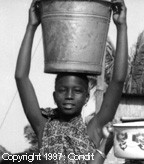Doka in Nigeria

Photo Source:
Bethany World Prayer Center
|
Send Joshua Project a map of this people group.
|
| People Name: | Doka |
| Country: | Nigeria |
| 10/40 Window: | Yes |
| Population: | 23,000 |
| World Population: | 23,000 |
| Primary Language: | Ejuele |
| Primary Religion: | Ethnic Religions |
| Christian Adherents: | 10.00 % |
| Evangelicals: | 3.00 % |
| Scripture: | Portions |
| Ministry Resources: | Yes |
| Jesus Film: | No |
| Audio Recordings: | Yes |
| People Cluster: | Benue |
| Affinity Bloc: | Sub-Saharan Peoples |
| Progress Level: |
|
Introduction / History
The Doka live in the Kachia Division of the Kaduna State in Nigeria. It is believed that the Doka are an offshoot of the Ankwe or Goemai people. Over the years, the Doka culture has been influenced by their Ngas and Jukun neighbors. Their language is closely related to that of the Chip and Mwahavul peoples. Kaduna, meaning "place of the crocodile," is a region flowing with numerous rivers. For this reason, the soil is rich and fertile in most of the area, making the Doka an agricultural people. The vegetation consists of low orchard bush with shade trees such as the silk-cotton, baobab, and shea butter trees. Deleb palms are numerous along river valleys and supply the people with such items as nuts, oil and fuel. Much of the Doka region has become a source of danger to both man and animal because of the presence of the disease-carrying tse-tse fly.
What Are Their Lives Like?
Like other savanna people in the Kaduna Division, the Doka are subsistence farmers, growing millet, maize, guinea corn, and beans. They also raise livestock such as goats, sheep, chickens, dogs, and horses. They eat goats, sheep, and chickens along with monkey and iguana which is a delicacy. The Doka engage in hunting, fishing, and some trading, but these are of lesser importance than agriculture. The women wake before sunrise and bathe behind their houses. During the day, they prepare meals and help their husbands in the fields. Women also spend time in the forests and bush collecting nuts, wild fruit, honey, and special plants used for medicines. Most of the small-scale trading is conducted by the women. Each morning, after they eat a light snack, the men of a household work in the fields until noon, when they relax in the shade of a tree and eat porridge brought by their wives. Another break follows around 3:30, after which time they will work again until getting ready for the evening meal that they eat with their brothers and children. Boys will help their fathers on the farm, spending some of their time chasing animals and birds away from the crops. Girls must clean dirty pots in the river, help their mothers prepare the meals, and gather forest products. The older men of the village spend much of their day making sure that the young boys properly tend to the livestock. Often, much of their time is spent simply relaxing or sometimes weaving. The Doka live in compact villages, located either in the hills or in dense forests. Their houses are made of mud with grass roofs that cover the outer porch and granary, which holds the season's harvest. Each village is a clan community separated into extended family compounds. The village headman handles village affairs with the help of a council of elders.
What Are Their Beliefs?
Although many of the Doka have become Muslim, most are ethnic religionists, still following their traditional religious practices and beliefs. They believe in evil spirits, but they do not live in fear of them. They pray to the "sky god" for health and prosperity. Many of the religious practices of the Doka center on ancestor worship (the belief that the spirits of deceased ancestors are alive and need to be fed and cared for). Central to this belief is the ancestral cult, in which the dodo (masked personification of a spirit) represents the ancestral spirits. Rites of initiation into this cult are elaborate and very important to all Doka. Through this cult they honor and worship their ancestors.
What Are Their Needs?
The Doka have few Christian resources available to them, and a full Bible needs to be translated into their language. There is a great need for evangelistic efforts to reach the Doka people for Christ.
Prayer Points
Pray that the Lord will show himself powerful by providing abundant rain and an excellent harvest for the Doko people. Pray for accurate biblical materials to be translated into the language of the Doka people of Nigeria. Pray for the Doka people to have a spiritual hunger that will lead them to Jesus Christ. Pray for an unstoppable Disciple Making Movement among the Doka people of Nigeria.